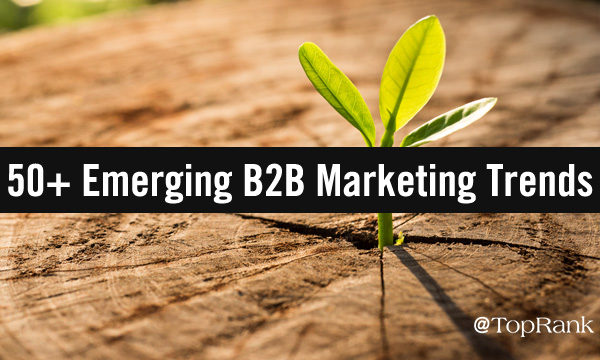
 Even though the “Roaring Twenties” moniker of a century ago today takes on a more menacing new tone in light of today’s COVID-19 pandemic, smart B2B marketers are still hard at work and looking ahead. The B2B marketing world of tomorrow will be shaped by the emerging marketing trends we have seen during the beginning of 2020, and we already have a wealth of insight to learn from new research data that has come out in recent marketing reports. We’ll take a look at:
Even though the “Roaring Twenties” moniker of a century ago today takes on a more menacing new tone in light of today’s COVID-19 pandemic, smart B2B marketers are still hard at work and looking ahead. The B2B marketing world of tomorrow will be shaped by the emerging marketing trends we have seen during the beginning of 2020, and we already have a wealth of insight to learn from new research data that has come out in recent marketing reports. We’ll take a look at:
- Impressive Results in a Growing Influencer Marketing Industry
- Social Media Changes & The Rising Importance of Trust
- The Global Impact of Artificial Intelligence (AI)
- The Role of Emerging Digital Interfaces in B2B Marketing
- How Voice & Conversational Search are Reworking Traditional Search Engine Optimization (SEO)
- How One-To-Few Publishing is Poised for B2B Emergence
Social Media Changes & The Rising Importance of Trust
We’ve written about the rising challenges B2B marketers have faced in light of the diminishing trust today’s social-media-saturated consumers place in marketing in general, and we’ve also explored a variety of tactics to help overcome them. In light of this, the recently-released Future Today Institute's 2020 Tech Trends Report¹ expects that social media users will increasingly place greater importance on trust and credibility. Another new study, the Rival IQ 2020 Social Media Industry Benchmark Report², has shown that social media engagement rates have fallen on Instagram, while those for Facebook and Twitter have remained largely unchanged. We’ll look at influencer marketing trends more closely in a separate dedicated section, however when it comes to social media engagement rates, influencers saw the second-highest engagement rate across all industries in Rival IQ’s report, as shown here.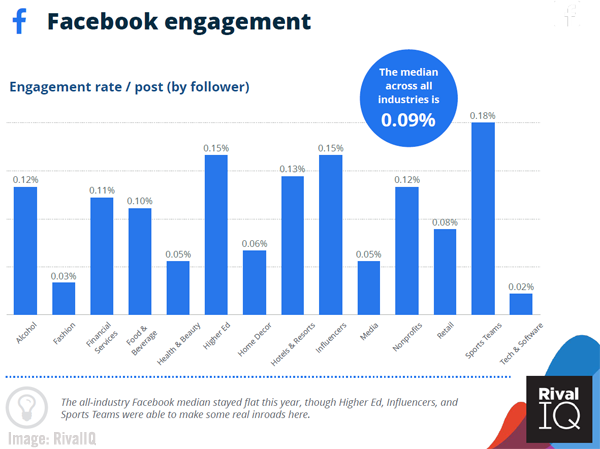 The report shows that while making social media marketing inroads on Facebook has been a challenge for brands, those using influencer marketing have fared better than those using traditional social media campaigns. B2B marketers in industries seeking to engage with younger consumers may want to start or increase their brand presence on Snapchat, as seventy-three percent of adults between the ages of 18 and 24 now use Snapchat.¹ The overall rate of social media posting frequency is down, with brands posting slightly less often on every channel in 2019, the RivalIQ report shows.² B2B marketers looking to tap into some of the most successful social media hashtags may want to consider implementing relevant giveaways and contests, as two of the most popular hashtags across all of the industries the RivalIQ report examined were those relating to contests and giveaways.² Aside from influencer marketing, multiple-photo image carousels were also shown to have particularly high engagement across industries, especially those on Instagram, which will re-serve carousels to users who didn’t initially engage.² Even so, engagement rates on Instagram were uniformly down, with an all-industry median that fell by 23 percent from 1.60 percent to 1.22 percent, as the following Rival IQ chart shows.²
The report shows that while making social media marketing inroads on Facebook has been a challenge for brands, those using influencer marketing have fared better than those using traditional social media campaigns. B2B marketers in industries seeking to engage with younger consumers may want to start or increase their brand presence on Snapchat, as seventy-three percent of adults between the ages of 18 and 24 now use Snapchat.¹ The overall rate of social media posting frequency is down, with brands posting slightly less often on every channel in 2019, the RivalIQ report shows.² B2B marketers looking to tap into some of the most successful social media hashtags may want to consider implementing relevant giveaways and contests, as two of the most popular hashtags across all of the industries the RivalIQ report examined were those relating to contests and giveaways.² Aside from influencer marketing, multiple-photo image carousels were also shown to have particularly high engagement across industries, especially those on Instagram, which will re-serve carousels to users who didn’t initially engage.² Even so, engagement rates on Instagram were uniformly down, with an all-industry median that fell by 23 percent from 1.60 percent to 1.22 percent, as the following Rival IQ chart shows.² 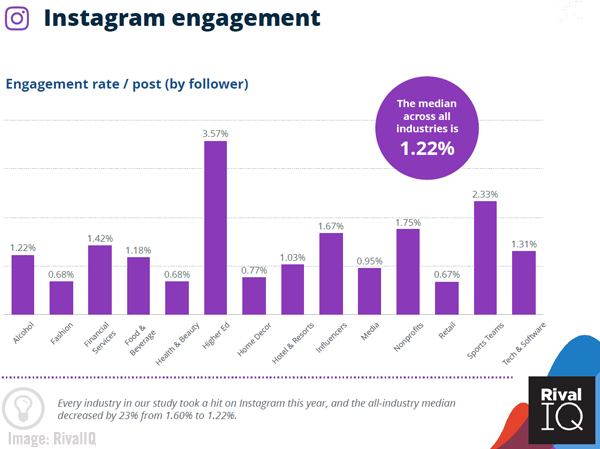 B2B marketers running campaigns on Twitter may wish to stay the course, as social media engagement on the platform stayed the same for the third year in a row.²
B2B marketers running campaigns on Twitter may wish to stay the course, as social media engagement on the platform stayed the same for the third year in a row.²
Impressive Results in a Growing Influencer Marketing Industry
Recent report data has shown that influencer marketing has garnered impressive results, helping lead the way to swift growth in the industry. Influencer marketing is expected to grow to some $9.7 billion in 2020, representing an increase of more than 50 percent for each year since 2016, according to the recently-published Influencer Marketing Hub 2020 Influencer Marketing Benchmark Report.³ The report’s estimated year-over-year growth for influencer marketing is shown below.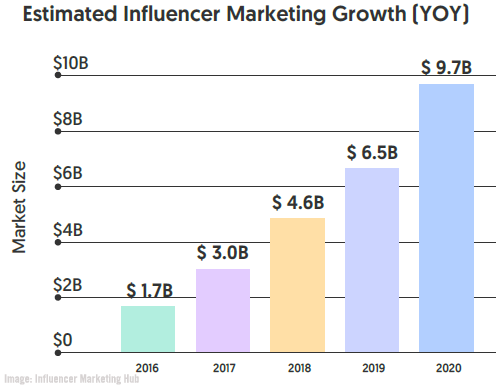 Influencer marketing has seen high advertising dollar values, a trend that continued in 2019, with average earned media value that increased to $5.78 from 2018’s level of $5.20, as shown here.³
Influencer marketing has seen high advertising dollar values, a trend that continued in 2019, with average earned media value that increased to $5.78 from 2018’s level of $5.20, as shown here.³ 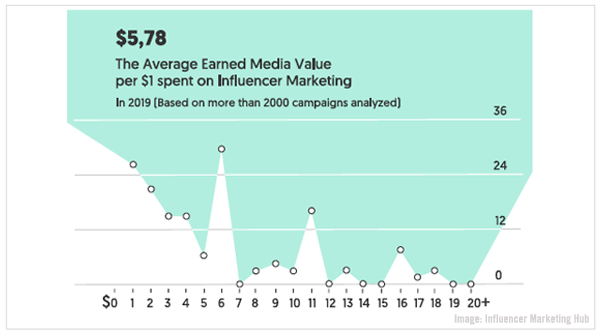 Influencer-marketing-savvy businesses have seen even higher returns, as much as $18 in earned media value for each dollar spent on influencer marketing.³ Large brands have seen a continued shift to using micro-influencers, and the most recent Influencer Marketing Hub report shows that during 2019 these firms utilized some 300 percent more micro-influencers than in 2016.³ With the strong performance seen in 2019 by influencer marketing, it should come as no surprise that 79 percent of respondents in the same report said that they plan to dedicate a budget to influencer marketing in 2020, as shown here.³
Influencer-marketing-savvy businesses have seen even higher returns, as much as $18 in earned media value for each dollar spent on influencer marketing.³ Large brands have seen a continued shift to using micro-influencers, and the most recent Influencer Marketing Hub report shows that during 2019 these firms utilized some 300 percent more micro-influencers than in 2016.³ With the strong performance seen in 2019 by influencer marketing, it should come as no surprise that 79 percent of respondents in the same report said that they plan to dedicate a budget to influencer marketing in 2020, as shown here.³  The portion of marketing budget dollars brands are spending on influencer marketing has also risen, with some 80 percent noting that they intend to spend at least 10 percent of their entire marketing budget on influencer marketing.³ Others said that they will spend nearly 40 percent of their marketing budget on influencer marketing, as outlined below.
The portion of marketing budget dollars brands are spending on influencer marketing has also risen, with some 80 percent noting that they intend to spend at least 10 percent of their entire marketing budget on influencer marketing.³ Others said that they will spend nearly 40 percent of their marketing budget on influencer marketing, as outlined below. 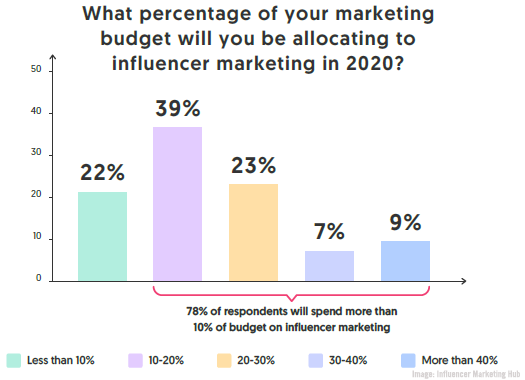 A full 91 percent of survey respondents saw influencer marketing as an effective form of marketing, with the most common gauge of influencer marketing success being conversions and sales, according to the report.³ As with social media marketing, influencer marketing has been shown to be particularly partial to Instagram, with some 87 percent using the platform.³ When it comes to B2B marketing, however, LinkedIn has remained far and away the most-used platform, as a similar 87 percent of Inc. 500 firms used LinkedIn for social media during 2019, topping a list of how the fastest-growing U.S. firms are using social media, outlined in a recent UMass Dartmouth report. Influencer marketing has seen significant grown over the past year, as the Influencer Marketing Hub report reveals 380 new influencer-marketing-related platforms and agencies entered the market over the last 12 months, which is outlined below.³
A full 91 percent of survey respondents saw influencer marketing as an effective form of marketing, with the most common gauge of influencer marketing success being conversions and sales, according to the report.³ As with social media marketing, influencer marketing has been shown to be particularly partial to Instagram, with some 87 percent using the platform.³ When it comes to B2B marketing, however, LinkedIn has remained far and away the most-used platform, as a similar 87 percent of Inc. 500 firms used LinkedIn for social media during 2019, topping a list of how the fastest-growing U.S. firms are using social media, outlined in a recent UMass Dartmouth report. Influencer marketing has seen significant grown over the past year, as the Influencer Marketing Hub report reveals 380 new influencer-marketing-related platforms and agencies entered the market over the last 12 months, which is outlined below.³ 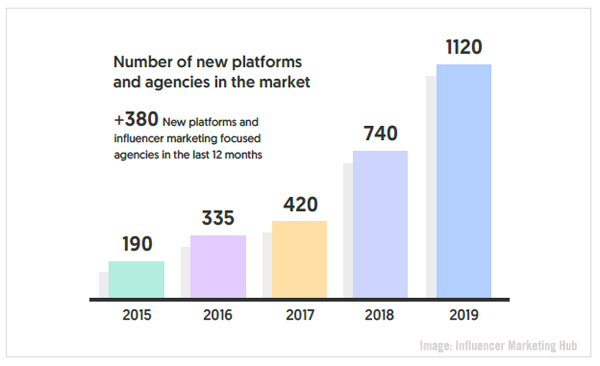 The influx of new influencer marketing platforms and agencies is a testament to the trust-building — and ultimately the success rates — of influencer marketing, yet those focused specifically on B2B influencer marketing are exceedingly rare. Luckily for B2B brands seeking top-caliber B2B marketing agencies specializing in influencer marketing, market research firm Forrester has maintained a report, and TopRank Marketing was honored to be listed as the only B2B marketing agency offering influencer marketing as a top capability in its “B2B Marketing Agencies, North America, Q1 2019” report. Additional influencer marketing report data shows that:
The influx of new influencer marketing platforms and agencies is a testament to the trust-building — and ultimately the success rates — of influencer marketing, yet those focused specifically on B2B influencer marketing are exceedingly rare. Luckily for B2B brands seeking top-caliber B2B marketing agencies specializing in influencer marketing, market research firm Forrester has maintained a report, and TopRank Marketing was honored to be listed as the only B2B marketing agency offering influencer marketing as a top capability in its “B2B Marketing Agencies, North America, Q1 2019” report. Additional influencer marketing report data shows that:
- Along with rising use of micro-influencers, nano-influencers — with under 1,000 followers — have seen impressive results, especially on Instagram, where they have seven times the engagement rate (7.2 percent) than mega-influencers who have more than 100,000 followers (1.1 percent).³
- Twitter nano-influencers saw 1.4 percent engagement, while mega-influencers saw only 0.3 percent of their followers providing tweet engagement.³
- 84 percent said that they had increased the volume of content they created over the past two years.³
- 72 percent said that they found the quality of customers gained through influencer marketing as better than from any other form of marketing.³
- Some 40 percent said that they used third-party influencer marketing platforms.³
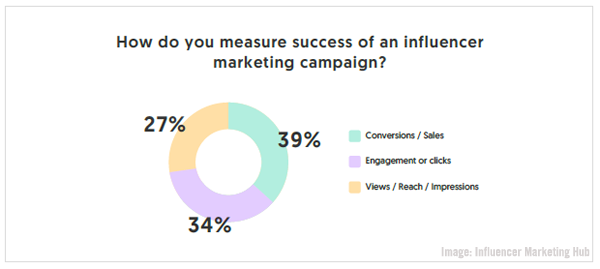 Rival IQ’s recent report data also shed some light on the success of influencer marketing, showing that as we previously mentioned in our social media observations, influencers increased their engagement rates on the often-tricky Facebook platform. A 10 percent increase in photo post engagement among influencers helped achieve the rise in Facebook engagement rate.² Influencers also achieved above-median performance on Instagram, in spite of seeing a 25 percent drop in engagement on the platform, and consistent Twitter performance as shown below.²
Rival IQ’s recent report data also shed some light on the success of influencer marketing, showing that as we previously mentioned in our social media observations, influencers increased their engagement rates on the often-tricky Facebook platform. A 10 percent increase in photo post engagement among influencers helped achieve the rise in Facebook engagement rate.² Influencers also achieved above-median performance on Instagram, in spite of seeing a 25 percent drop in engagement on the platform, and consistent Twitter performance as shown below.² 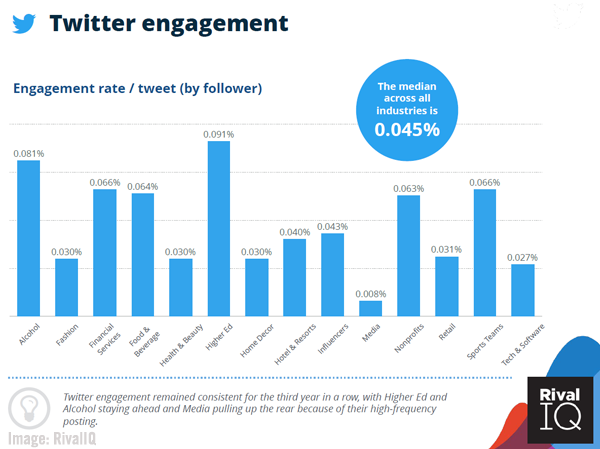 Videos and status updates were the most engaging types of tweets on Twitter among influencers according to the Rival IQ report, topping photo and link tweets, as shown here.
Videos and status updates were the most engaging types of tweets on Twitter among influencers according to the Rival IQ report, topping photo and link tweets, as shown here. 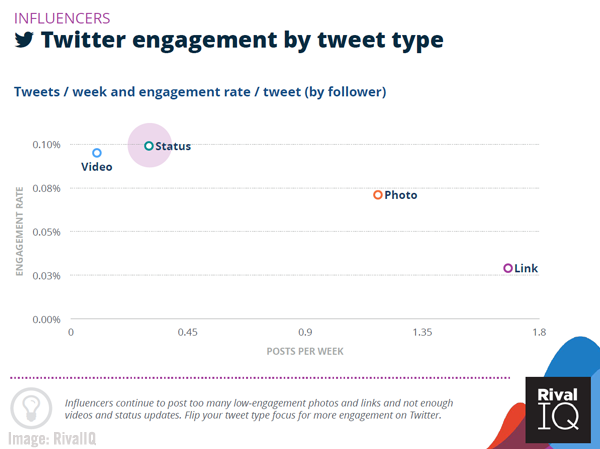
The Global Impact of Artificial Intelligence
Artificial intelligence will continue to have a global impact in the future, according to the Future Today Institute report, which found that:- Between 2020 and 2024 the global AI market is expected to grow 20 percent annually between 2020 and 2024.¹
- Worldwide economic growth generated by AI may hit an astounding $16 trillion by the end of the 2020s.¹
- A daily data-creation total of some 463 exabytes is expected by 2025, roughly the same as 77 billion Netflix movie streams.¹ Sorting through and utilizing vast amounts of data is likely to continue as a prime challenge to B2B marketers in the years ahead. By the end of the decade some 50 billion devices may also be online, generating huge amounts of data.¹
- By 2022 the AI chip market is expected to quadruple, to $6.7 billion, up from $1.66 billion in 2018.¹
- Significant funding is being invested for AI initiatives around the world, including Softbank, which in 2019 launched a $108 billion fund targeting AI startups.¹
The Role of Emerging Digital Interfaces in B2B Marketing
In coming months and years B2B marketers will see greater opportunities in the realm of emerging digital interfaces including augmented and virtual reality (AR and VR), devices that we increasingly wear instead of just carry, and other technology that can help take experiential content to the next level. The Future Today Institute report data shows the following trends of interest to B2B marketers:- $18.8 billion is expected to be spent on AR and VR in 2020, climbing to some $200 billion by 2024.¹
- Over 1,000 wearable devices are presently available.¹
- $370 million in wearable device sales is forecast by the end of 2020.¹
Voice & Conversational Search Rework Traditional SEO
B2B marketers face challenges in making their content discoverable to audiences using changing technologies, and some of the new report data shows the following opportunities and trends:- Traditional SEO is increasingly expanding into new realms, such as with voice search optimization (VSO).¹
- Search query intent and searches based on conversation or even what a consumer is looking at are new challenges in search.¹
- New types of searches will require B2B firms to implement new forms of optimization in coming years.¹
One-To-Few Publishing Poised for B2B Emergence
B2B marketers are likely to see an increased demand for digital methods to make more meaningful connections with smaller, relevant, and loyal audiences:- The use of more personalized content in the form of newsletters, podcasts and niche networks will increase, especially those that are infused with authenticity.¹
- Closer online communities such as those in Facebook and LinkedIn groups will become more important than ever.¹
- Limited-edition content such as pop-up collaborative newsrooms focusing on hyper-relevant and specialized topics are expected to become increasingly important.¹
How Will You Implement Emerging B2B Marketing Trends?
These are only some of the emerging marketing trends that will combine to play important roles in B2B marketing beyond 2020, with others such as our "Top 10 B2B Digital Marketing Trends in 2020" also offering helpful insight to guide your efforts. We hope you’ve found the trend data from the Future Today Institute's 2020 Tech Trends Report, Rival IQ’s 2020 Social Media Industry Benchmark Report, and Influencer Marketing Hub’s 2020 Influencer Marketing Benchmark Report to be helpful. Forming a smart and successful B2B marketing foundation takes significant amounts of time and effort, which leads some brands to work with a top B2B marketing agency such as TopRank Marketing. Check out our B2B marketing resources and discover why leading brands such as Adobe, LinkedIn, Dell, 3M, Slack, and Monday.com have chosen to work with TopRank Marketing. Sources: ¹ Future Today Institute's 2020 Tech Trends Report ² Rival IQ 2020 Social Media Industry Benchmark Report ³ Influencer Marketing Hub 2020 Influencer Marketing Benchmark ReportThe post 50+ Top B2B Marketing Insights From Recent Emerging Trend Reports appeared first on Online Marketing Blog - TopRank®.
from Online Marketing Blog – TopRank® https://ift.tt/3bq9FJe
via IFTTT
No comments:
Post a Comment